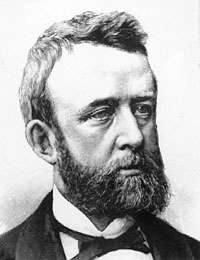Axel Gudbrand Blytt

Axel Gudbrand Blytt (19 May 1843 – 18 July 1898) was a Norwegian botanist and geologist. His father was Matthias Numsen Blytt, also a botanist. Axel Blytt served at the Christiania Herbarium at the University of Oslo from 1865, first as a conservator, then, from 1880, as a professor. Based partly on his father's work, he published in the 1870s the book Essay on the Immigration of the Norwegian Flora during Alternating Rainy and Dry Periods. He is today best known for developing the Blytt-Sernander theory of climatic change. His work, Essay on the Immigration of Norwegian Flora. (1876) was read by, and influenced, Charles Darwin.[1]
Blyttberget, a high crag southeast of Nordlaguna on the Norwegian island of Jan Mayen, is named for him.[2] The German botanist Wilhelm Schimper named several mosses after him as well.
The remaining existent specimens Blytt collected on his studies are held at the Botanical Museum of the University of Oslo. The Buffalo Museum of Science in Buffalo, New York also holds a collection of specimens attributed to a collector identified as "Blytt", who is likely Axel Blytt. This is evidenced by Charles Peck, the New York State Botanist from 1883 to 1913, in his 1872 Report of the Botanist to the New York Senate.[3] Peck wrote that he had received 22 specimens of lichens from the University of Norway, Christiana (Oslo), Norway, for the New York State Cabinet. There is also a mention of Blytt in correspondence between the Swiss botanist Leo Lesquereux and George William Clinton, then President of the Buffalo Museum of Natural Sciences, regarding specimens and a visit to the Buffalo Museum by Lesquereux. Though the existing correspondence only provides Lesquereux's letters, he refers to Blytt as "a good Norwegian Botanist I do not know his address in any other way than as you write it. Christiania Norway."[4]
References
- ↑ Charles Darwin (1903). More letters of Charles Darwin: a record of his work in a series of hitherto unpublished letters. J. Murray. pp. 11, 17.
- ↑ Orvin, A.K. (1960) The Place-Names of Jan Mayen. Skrifter. Norsk Polarinstitutt. Number 120. pp. 14.
- ↑ Peck, Charles William. (1872) Report of the Botanist. 25th Annual Report on the State Museum of Natural History. New York Senate document No. 83.
- ↑ Eckel, P.M. (Oct. 2005) Correspondence of Leo Lesquereux and G. W. Clinton. Vol. 3. No. 51 [M 178] Res Botanica. Missouri Botanical Garden.
- ↑ IPNI. A.Blytt.
External links
| Wikisource has original works written by or about: Axel Gudbrand Blytt |
Works
The Probable Cause of the Displacement of Beach-lines: An Attempt to Compute Geological Epochs (1889)
